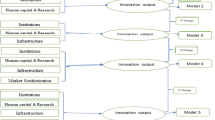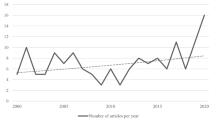Abstract
We conduct a regression analysis of the effects of knowledge on aggregate economic performance using data from the United Nations Development Program (UNDP) and the World Bank for four groups of countries during 1995–2001. Our results indicate that knowledge is a key driver of economic growth for each group of countries. More importantly, we find that variation in economic performance among these groups may be related to the timing of investment in education, R&D, and information technology, as well as economic policies that affect trade and foreign direct investment.
Similar content being viewed by others
References
Bassanini, A., S. Scarpetta, and I. Visco, May 2000, ‘Knowledge, Technology, and Economic Growth: Recent Evidence from OECD Countries,’ National Bank of Belgium Conference, NBB Working Paper No. 6.
Dahlman, C., 2002, ‘The Knowledge Economy: Concepts, Trends, Benchmarking,’ Conference on Using Knowledge for Development in EU Accession Countries, World Bank Institute, February 19–22.
J. Dedrick V. Gurbaxani K.L. Kraemer (2003) ArticleTitle‘Information Technology and Economic Performance: a Critical Review of the Empirical Literature’ ACM Computing Surveys 35 IssueID1 1–28 Occurrence Handle10.1145/641865.641866
Falvey, R., N. Foster, and D. Greenaway, 2002, ‘Knowledge Spillovers, North-South Trade and Growth.’ Unpublished working paper.
Norling, P.M., 2002, ‘Find Your Place in the National Innovation System,’ Research and Technology Management, September–October, 11–12.
J. Mokyr (1999) Knowledge, Technology, and Economic Growth During the Industrial Revolution forthcoming in Neither Chance nor Necessity: Evolutionary Models and Economic History Princeton University Press Princeton
R.L. Moomaw J.K. Mullen M. Williams (2002) ArticleTitle‘Human and Knowledge Capital: A Contribution to the Empirics of State Economic Growth’ Atlantic Economic Journal 30 IssueID1 48–60
P. Morrison J. Catherine D.S. Siegel (2001) ArticleTitle‘The Impact of Technology, Trade, and outsourcing on Employment and Labor Composition’ Scandinavian Journal of Economics 103 IssueID2 241–264
P. Romer (1993) ArticleTitle‘Idea Gaps, and Object Gaps in Economic Development’ Journal of Monetary Economics 32 543–573 Occurrence Handle10.1016/0304-3932(93)90029-F
K. Saggi (2002) ArticleTitle‘Trade, Foreign Direct Investment, and International Technology Transfer: A Survey’ The World Bank Research Observer 17 IssueID2 191–235 Occurrence Handle10.1093/wbro/17.2.191
United Nations Development Program, ‘Human Development Reports 1995–2001,’ United Nations.
P. Windrum M. Tomlinson (1999) ArticleTitle‘Knowledge-Intensive Services and International Competitiveness: A Four Country Comparison’ Technology Analysis and Strategic Management 11 IssueID3 391–408
World Bank Institute database, World Bank Institute.
Author information
Authors and Affiliations
Corresponding author
Rights and permissions
About this article
Cite this article
Driouchi, A., Azelmad, E.M. & Anders, G.C. An Econometric Analysis of the Role of Knowledge in Economic Performance. J Technol Transfer 31, 241–255 (2006). https://doi.org/10.1007/s10961-005-6109-9
Issue Date:
DOI: https://doi.org/10.1007/s10961-005-6109-9




